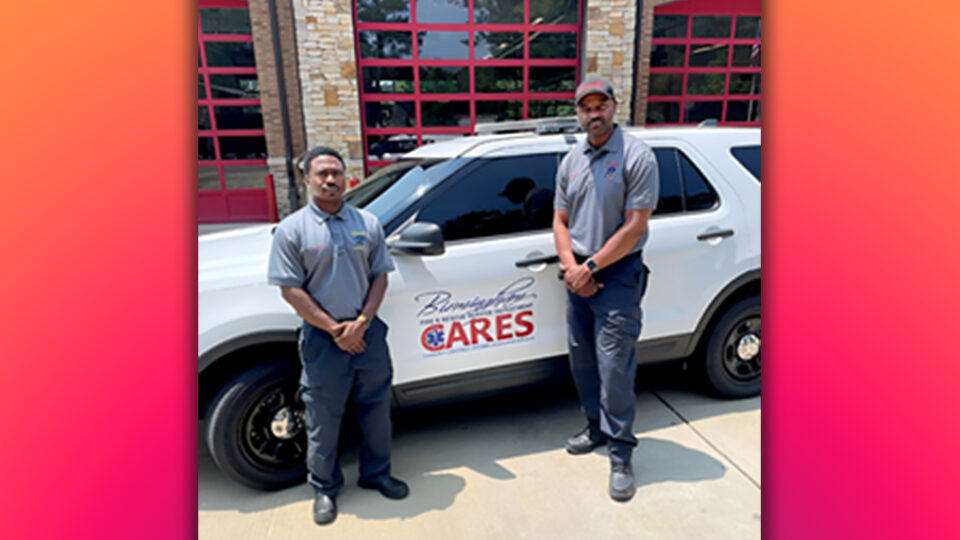Emergency departments across Birmingham and the country are all experiencing similar stressors: full waiting rooms, longer than normal wait times, and often seeing patients visit for reasons that do not warrant emergency-level care. Moreover, a lot of emergency department staff recognize frequently visiting patients whose visits are more appropriate for outpatient or primary care or who are in need of other social services.
In recognizing this strain on the emergency department system in Birmingham, Cooper Green Mercy Health Services Authority, an affiliate of UAB Health System, and the City of Birmingham Fire and Rescue Service have entered a community paramedicine initiative and agreement through the Community Assistance, Referrals and Education Services program, aimed at helping alleviate inpatient readmission and emergency room visits by meeting patients where they are — at home.
Launched in November 2022, the visit-based program connects emergency medical and paramedicine technicians who are trained specifically in-home follow-up care and treatment with patients who have been identified as having visited the emergency room more than three times. Once identified, the patient’s name gets directed to the CARES team and the process of connecting with them in person begins.
Cooper Green provides these community paramedicine services at no charge to better enhance and enrich the lives of Jefferson County residents.
By providing certain medical interventions, education, and preventive care, the trained community paramedicine team members are able to get a better understanding of what the patient’s true needs are, potentially identify new medical conditions, and connect these patients with appropriate social or medical resources in the Birmingham community, directing most to and through Cooper Green.
“The CARES program is really helping to chip away at a significant need in our community,” says Michael Boackle, coordinator of Emergency Preparedness at Cooper Green Mercy Health Services Authority. “What we are seeing is that there are countless patients who have and will really benefit from getting directed to appropriate resources. In turn, we are helping provide a legitimate solution to the critical problem of overcrowded emergency departments and medical confusion.”
Brian Blakes, a team leader with the CARES program, is seeing firsthand what he calls “medicine miseducation” in so many of the patients he is treating and meeting with.
“A lot of people are using the emergency department as primary care or as a means of connecting with social resources that they are lacking, and what we are finding is that a lot of these ED visits are coming down to medical miseducation,” Blakes says. “Through CARES, we’re trying to get across to people that there are other means in the community to get resources and that we are here to help connect them with their needs.”
Blakes recounted meeting a patient who could not read, so she was unable to figure out how often to take her prescribed medicine each day. Instead of having her visit the emergency department unnecessarily, Blakes realized that educating her on how to take her prescriptions was simply what she was looking for. Other patients, he says, are lacking transportation so they cannot get to their primary care doctor and ultimately call 911 for a ride, and so many do not even have established primary care.
“That’s when we are able to connect patients with Cooper Green and social services like transportation, educating them on how to get to Cooper Green and what services they can access,” Blakes says.
To date, the CARES program has helped connect numerous patients with community-based resources and bridge their care to Cooper Green. According to Boackle, more than half of the patients they are interacting with or aware of have no primary care doctor, indicating the need for this type of direct intervention.
In looking at the future success of the agreement between Cooper Green and Birmingham Fire and Rescue, Boackle thinks connecting the dots for patients is of the utmost importance.
“We have an urgent care clinic here at Cooper Green, and a huge motivator of this program is to educate people on where they should come if they need to access a certain medical specialty and what they come to Cooper Green for versus what purpose the UAB emergency department serves. These conversations are key,” Boackle says.
Cooper Green Mercy Health, an affiliate of the UAB Health System, is a full-service ambulatory care facility that includes primary and specialty care clinics, urgent care, physical, occupational, and speech therapy, laboratory services, imaging and pharmacy.





